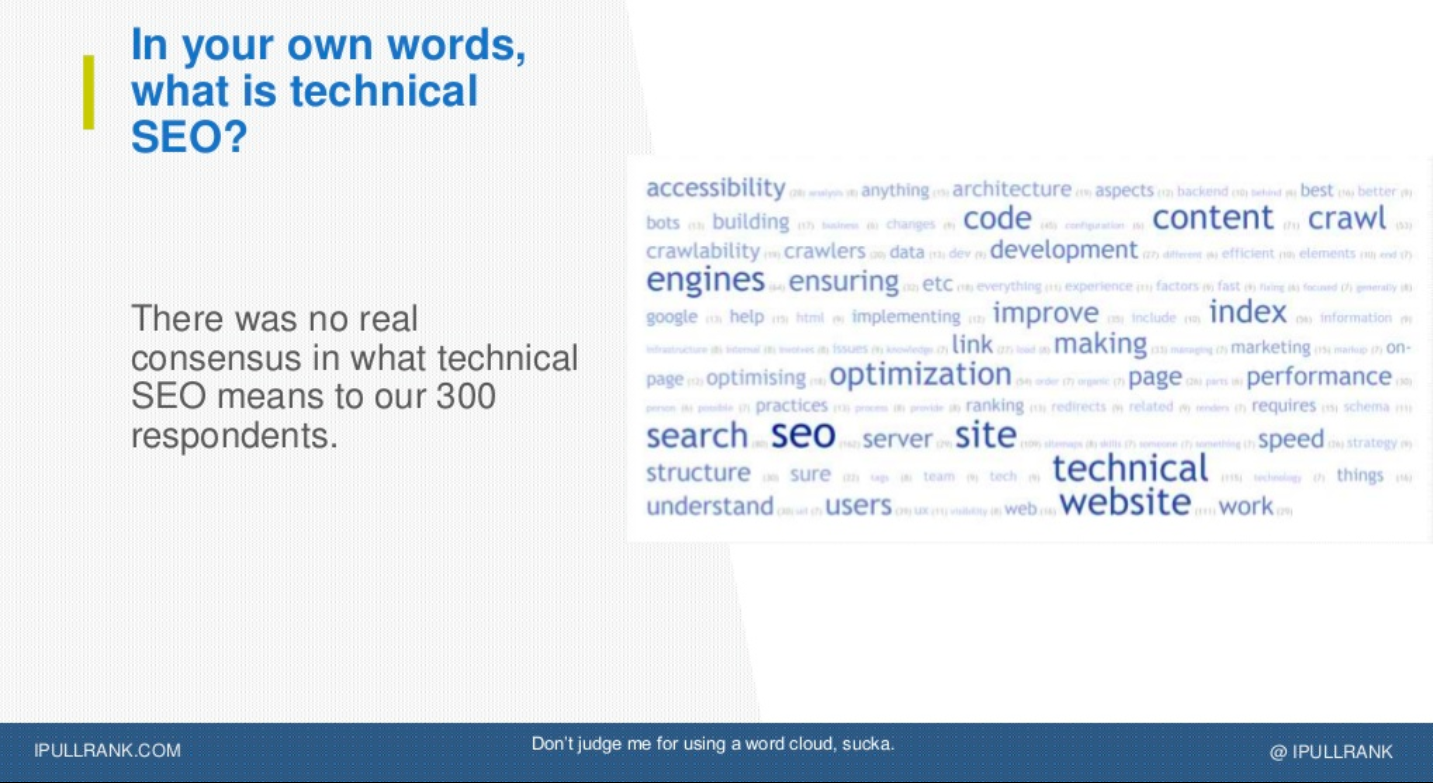What do we need to know about technical SEO in 2019? Here’s an overview to keep in mind.
Technical SEO is different from what we know as standard SEO. It dives deeper into the analysis of content and it can help you draw very interesting conclusions.
Mike King from iPullRank delivered a highly informative presentation in Catalyst’s TechSEO Boost and it can give us a better idea of the state, or actually, the statelessness of technical SEO.
Whether you’re an SEO expert or you’re just getting started, here are some key points to consider from Mike’s session.
Defining technical SEO
The first challenge that comes with technical SEO has to do with its actual definition. It’s not always easy to explain it.
In fact, it’s even hard for SEO professionals to define it.
Mike King asked 300 people to provide their own definition to what technical SEO really is. Unsurprisingly, there was no consistency in its definition. Many respondents indicated that web performance and information architecture are parts of what technical SEO does. However, these are tasks that other roles typically perform.
As Mike King said, “everything we do is someone else’s job.”
The best way to define technical SEO as a profession then is to think of it as the state of being curious. Technical SEO experts are curious enough to play with things that they can change.
What we need to remember is that there is no technical SEO as a definitive discipline. It can be the job of putting things together to make things scale and solve problems that affect SEO.
Thus, if we want to explain the difference between technical and standard SEO, we need to remember that technical SEO is about scalability, depth, detail, advanced cross-functional understanding, and also execution.

The challenge of metrics
Another challenge that we’re seeing in technical SEO — and SEO in general sometimes — is that the metrics are too opaque.
There are many tools to measure our own definition of success but we still don’t have peer-reviewed and transparent definitions of any proprietary link metrics.
How can we tell which metrics matter most of all? How do we define success and how can we all agree to it?
These bring out the need to standardize SEO.
We need to standardize three things:
- Open PageRank Computation
- Crawl Data Portability
- Open Rankings
These can help us improve our SEO expertise by sharing a common understanding with everyone in the industry.
Technical SEO in 2019
If you want to improve your technical SEO skills in 2019, here are some key things to consider.
- Natural language generation can be a great ally in the future. We can take care of the good content and it can perfectly optimize it for the SERPs.
- Semantic keyword research can also be helpful and it’s important to spend more time on it. It can even help you pull the right SEO metrics to draw better conclusions.
There are three types of tests that are most relevant to technical SEO:
- Unit tests (testing an individual function to ensure that it works)
- Integration tests (using your logic to build a bigger system)
- UI tests (testing frontend interface on your website, which is the slowest version of testing)
Headless browsers can be very useful in the process of test-driven development. We tend to use them for Javascript-rendered content but they are actually made for automated testing.
From this perspective, we can think of technical SEO professionals as product managers. They are focusing on a test-driven development to run tests and experiment with different scenarios.

Here are some additional tips that have to do with technical SEO:
- There will always be technical expectations for content that ranks well. We can deal these with the right text analysis, the perfect optimization and the content review that will lead to exactly what Google wants to see.
- It’s useful to spend more time on automated testing, unit testing and also headless browsers. You can perform tests to see if they are how you expect them to be. It’s the idea of test-driven development that can help you check every single component.
- Log file analysis is crucial. If you’re not doing it, then you’re just guessing.
- PageRank is still our measurement. Even if we don’t have complete visibility, it’s still important to understand it.
- We need to be proactive to understand Google. Don’t be afraid to dig into data to understand how Google works
- Don’t underestimate the power of internal link building. The larger the page, the higher the success.
Tools to use in technical SEO
If you want to start using the right tools for technical SEO, here is the list that Mike provided in his presentation.
You can also find out more about free technical SEO tools in our own list.
Overview
What we need to remember when it comes to technical SEO is that it’s all about being curious. You don’t need to have a clear definition of your role and your tasks. These may depend on the company that you’re working for.
But you still need to be comfortable with figuring out how things work. You need to have the inquisitive mind to investigate why one thing succeeded over another.
And this is probably the best way to dive into it with the right mindset.
The post The state (or statelessness) of technical SEO in 2019 appeared first on Search Engine Watch.
source https://searchenginewatch.com/2019/02/06/technical-seo-2019-statelessness/
No comments:
Post a Comment